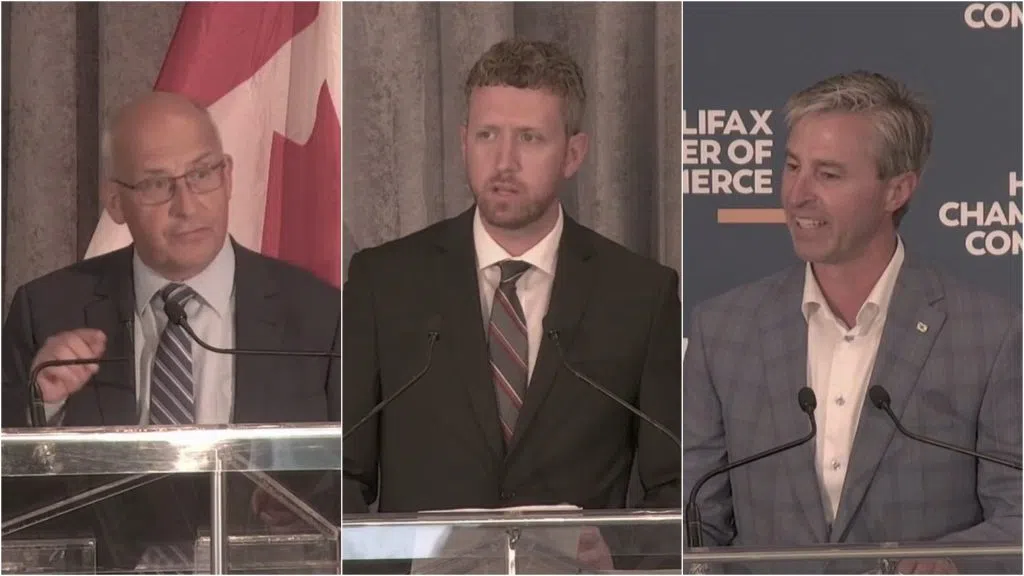
Credit: Halifax Chamber of Commerce
The Liberal Party’s Iain Rankin, the Progressive Conservative Party’s Tim Houston, and the NDP’s Gary Burrill fielded questions from Halifax’s business community over the course of 90 minutes on August 4.
Hosted by the Chamber’s CEO Patrick Sullivan, the debate featured many of the same talking points the candidates have hit for most of the election campaign.
PC leader Tim Houston continued his trend of tying most questions to healthcare. The PCs promise of massive spending to fix the province’s ailing health system has been his focal point.
Burrill touted his party’s commitment to permanent rent control and a $15 minimum wage. Rankin, meanwhile, consistently brought up policies and successes from the Liberal government under Stephen McNeil.
But today’s debate also touched on some less-talked-about topics, leading to some interesting answers from each of the leaders.
Street Checks, Systematic Racism, And Reparations
As moderator Patrick Sullivan pointed, the pandemic highlighted the systematic racism at work in Nova Scotia’s public and private sectors.
He asked each of the candidates how they plan to address “the inequities in our society” and what supports they would provide to do that.
“We need to do much more,” Rankin said, “because systematic racism is embedded in all our institutions, frankly.”
He brought up his government’s recent expansion of its Office of Diversity and Inclusion, which is looking at how to provide resources to “community-lead initiatives.”
He said his government has undergone reviews looking at “race-based data” and is analyzing how to provide more equitable health care, with better outcomes for all communities.
“There’s so much more work to do, and how we’re going to be able to do it is working in collaboration with communities” and making caucus and staff more representative, Rankin said.
Burrill said there are some things the government needs to do “immediately,” like implementing all the recommendations in Dr. Scot Wortley’s Street Checks Report.
That includes plugging what Burrill called “loopholes that allow for the continuation, in other forms, of what is an illegal activity in street checks.”
Burrill also talked about creating a panel on environmental racism that is empowered to “bring recommendations on compensation back to the legislature.”
“I also think that the time has come in our province when our government needs to step forward and take part in the great conversations of our era, on the subject of reparations,” he added.
He also pointed out that Liberals and PCs multiple times voted down NDP legislation that would force the government to implement recommendations from the Truth And Reconciliation Commission.
Houston, meanwhile, said the government needs to do more than take “symbolic action.”
For the PCs, that means addressing what Houston believes is the “core” of the issue: education.
He pointed out that he didn’t learn about things like residential schools growing up in Nova Scotia’s education system and said the PCs would work with “diverse communities” to put “education right in the curriculum at all grade levels.”
“I feel very, very strongly that knowledge leads to understanding, and understanding leads to kindness,” he said.
Must It Be Climate Versus Economy?
Sullivan also asked how each party would “prioritize climate change against economic recovery pressures.”
Burrill took issue with the question, arguing that the climate-versus-economy contrast is outdated.
“We know that one of the great directions of investment capital in the last couple of years has been away from the world of fossil fuels and into the world of renewables,” he said.
He argued Nova Scotia’s economic success will depend on its ability to align itself with that economic change.
Burrill outlined specific targets the NDP wants to meet to curb greenhouse gas emissions.
Those are changing the limit on greenhouse gas emission to 50 percent below 1990 levels by 2030, moving to 90 percent renewable energy production by 2030, and eliminating coal power by 2030.
Rankin put forward similar arguments.
He pointed out Nova Scotia has the most ambitious greenhouse gas targets in the country and that the province plans to be the first in the country to hit net-zero carbon emissions.
To get there, he said his government plans to bring more renewable energy onto the grid, increase efficiency programs, and continue its “ambitious” training programs to help tradespeople learn the skills needed to retrofit buildings.
He said by “channeling these investments” the province can reduce emissions and create more jobs.
Apparently arguing the opposite of Burrill, Houston said the province needs to “find a balance” as it seeks to protect the environment.
He argued PC legislation from 2007 has provided the roadmap other governments have followed to make Nova Scotia a leader in climate policy.
He also attempted to tie the issue to his party’s “Nova Scotia Loyal” program, arguing more people buying local has “a huge impact on improving our environment.”
The PC party’s platform on the environment calls for protecting 20 percent of the provinces land and water mass by 2030 and ensuring 80 percent of electricity in the province is renewable by 2030. It does not set targets for greenhouse gas emissions.
Houston and Burrill both attacked Rankin for the Liberal government’s handling of environmental protection.
Burrill said it “defies credibility” that Rankin presents himself as an environmental champion after his government gutted its own biodiversity protection bill.
Houston, meanwhile, told Rankin “you can’t really call yourself an environmentalist and do what you did at Owl’s Head,” referring to the Liberal government’s decision to sell the crown land to a developer.








